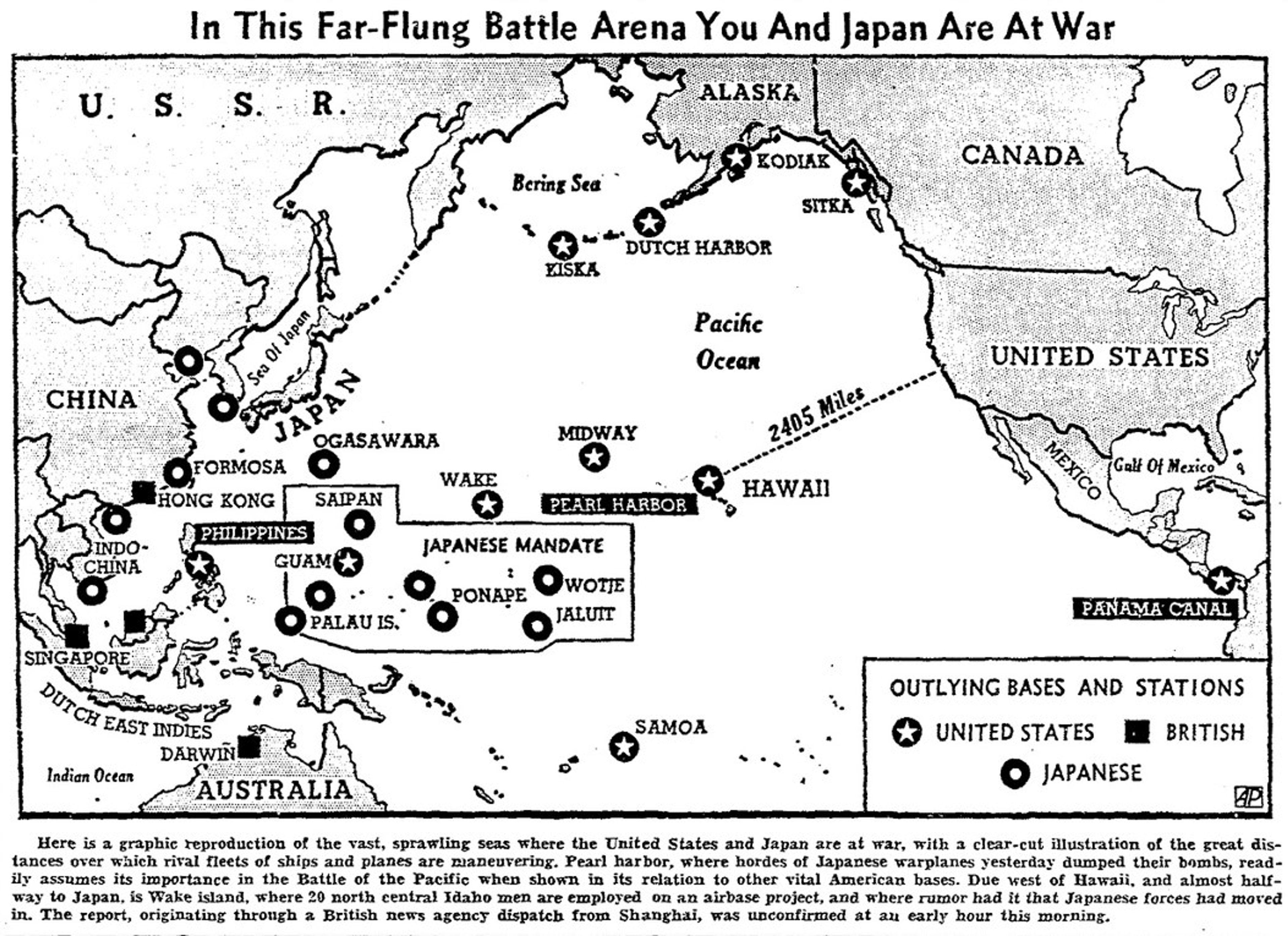FROM THE ARCHIVES: Pacific Northwest on war basis as armed forces leap to action
Military and civilian forces on high alert and communities bracing for potential threats
FROM THE ARCHIVES: This story was published in the Tribune on Dec. 8, 1941, the day after Japan's surprise attack on Pearl Harbor.
The Pacific northwest on a war footing Sunday.
Only a few hours after the quiet of a peaceful sabbath was broken be the surprise Japanese attack on Honolulu, army and navy forces and civilian defense organizations were able to announce: "We're ready for any emergency."
Every military and naval post in the area went on a war basis at once. All leaves and furloughs were canceled. Every man was subject to call at any moment throughout the 24 hours of day and night.
At Fort Lewis as well as at smaller army stations headquarters offices, which had been closed over the weekend, were reopened and became beehives of industry. The same was true at naval shore stations and aboard ships of war in Bremerton.
Navy, Army Heads Busy
Rear Admiral Charles D. Freeman, commandant of the 13th naval district, was at his desk in the Bremerton navy yard in constant direct communication with his chief-of-staff, Capt. Guy Davis at the staff headquarters in the exchange building in Seattle.
"This is no time to talk" was Capt. Davis' only comment to reporters.
Maj. Gen. Kenyon A. Joyce, commanding the IX army corps, was in his office at Fort Lewis, too, in telephonic conversations with both the headquarters of Lieut. Gen. John L. DeWitt, fourth army commander in San Francisco, and the war department in Washington.
Service Men Break Leaves
Soldiers and sailors on leave in Seattle started back to their posts without waiting for orders. Taxicab companies found their facilities taxed to the utmost to supply them with transportation.
The Seattle police radio at regular intervals broadcast a call to all soldiers, sailors and marines to report to their stations at once. Police departments in Seattle and other cities of the Pacific northwest were placed on 24-hour basis to guard against sabotage.
Gov. A.B. Langlie of Washington state ordered the state patrol on a 24-hour basis and called a meeting of his department heads to discuss steps to be taken in event of an emergency.
Civilians Alert
And the smooth working plan mapped out by the 2nd interceptor command for the aerial defense of the Pacific northwest went into action under command of Brig. Gen. Carlyle Wash. Civilian observers were on duty to spot any hostile planes that might appear along the Washington and Oregon coast. Interceptor planes at Paine field, near Everett, and in Portland, were on the alert.
Joseph K. Carson Jr., of Portland, Pacific coast inspector general of civilian defense, ordered the Pacific northwest to mobilize its civilian defense volunteers. Before his order came to the various cities the volunteers were reporting for duty.
Mayor Earl Riley of Portland called that city's civilian defense agencies to meet at 7 p.m.
CDA Messages Governors
San Francisco, Dec. 7 -- Governors of states in the ninth corps ares were urged by the civilian defense administration tonight to declare a state of emergency and ask local authorities to take all possible measures to prevent sabotage of any defense industry.
Jack Helms, regional director of the civilian defense organization, also sent the governor a "purely advisory" telegram saying that Fiorello LaGuardia, as mayor of New York, had ordered all Japanese there to stay in their homes pending official determination of their status.
"You may wish to advise similar action in your state," Heims telegraphed.
California, largest state in the area, already is operating under a declaration of emergency. Other states whose governors were sent telegrams were Nevada, Oregon, Washington, Idaho, Montana and Utah.
Portland Harbor Patrolled
Portland, Ore., Dec. 7 -- Soldiers and police took up patrol of the Portland harbor area today as the Pacific northwest mobilized its civilian defense force.
Troops from Vancouver barracks, Wash., guarded government stores at the municipal terminal and special police, armed with rifles, patrolled docks and bridges.
Visitors Barred from Dams
Visitors were barred from Bonneville and Grand Coulee dams, giant government projects on the Columbia river which supply shipyards, aluminum plants and chemical plants with power.
The Bonneville administration went on a full war footing and doubled the number of guards around the dams.
Joseph K. Carson Jr., Pacific coast inspector general of civilian defense, ordered the Pacific northwest today to mobilize civilian defense volunteers at once.
More Volunteers Asked
He told mayors of Seattle, Tacoma, Spokane and Portland to increase immediately administrative and secretarial staffs to enroll additional volunteers for duty in air raid warning, police auxiliaries, auxiliary fire service and emergency medical aid.
Carson, also commander of the American Legion, asked legionnaires to report to county defense coordinators.
Mayor Riley called city civilian defense agencies to a meeting at 7 p.m., including all police and the FBI.
J. Douglas Swenson, Portland FBI agent, said he was expecting instructions regarding Japanese aliens.
Ben Morrow, superintendent of the Portland water works, ordered out guards for reservoirs and pipe lines.
City Police Capt. John J. Keegan, commander of the Portland guard and patrol units, asked the 900 members of the units to remain at home for a possible mobilization call.
The guards will patrol the waterfront and industrial areas.









